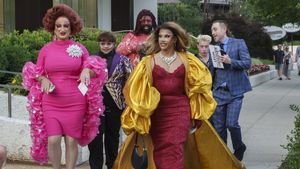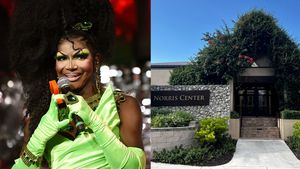Photography by Daniel Seung Lee. Market Editor: Michael cook. Styling by Alexandra Weiss. Groomer: Elizabeth Lehrman. Styling Assistant: Amber Nicole Alston. Earring by Chris Habana.
Olly Alexander, frontman of British electro-pop outfit Years & Years, is waving goodbye to his future husband and his dog, Lenny. We're in a minimalist cafe on a quaint street in East London, a few feet from Alexander's apartment. "He's leaving," he whispers, as his crush -- whom he first laid eyes upon a mere five minutes earlier -- gets up to exit, latte in hand. "There's my soul mate walking away..."
Related | Olly Alexander is Ready to Be Rihanna's Tambourine-Shaking Backup Dancer
It's this playful openness that makes the 27-year-old Alexander such a great pop star. It's what enables him to nail the details of the queer experience, be it via the maximalist frustrations of 2015's "King" (a U.K. No. 1), the unabashed joy of the gently pulsating "Shine" (written about his past relationship with ex-Clean Bandit member Neil Amin-Smith), or "Meteorite," a song about bottoming that wound up on the soundtrack to a Bridget Jones movie.
With the success of their debut album, Communion, Years & Years helped demonstrate that there was still life left in histrionic synth-pop, all while Alexander found his footing as an outspoken commentator on topics ranging from LGBTQ rights to mental health advocacy. The band's new second album, Palo Santo, heralded by the Timbaland-esque strut of lead single "Sanctify" (about "a guy who identifies as straight but is hiding part of his sexuality"), illuminates the ways its members have since evolved. But a lot is resting on Alexander's slim shoulders.
Dressed in a faded My Own Private Idaho T-shirt (on which River Phoenix rests his head on Keanu Reeves's shoulder), torn black dungarees, and a puffy camo jacket, Alexander is relaxed, breezily chatting about Prince Harry's imminent wedding and the return of Christina Aguilera ("I'm cautiously optimistic about the music"). His hair is a faded copper, a color change inspired in part by one of his contemporaries.
" Troye Sivan dyed his hair blond, so I had to do something different," he says, giggling. He speaks rapidly and flits between roaring laughter and softer introspection, often grazing the inside of his arm when things get a little deep. "I was just so passionate about the music being a certain way and the videos being a certain way," he says of the new album. "Mike [Goldsworthy, synths and bass] and Emre [Turkmen, synths] were just happy to let me do it."

In fact, Palo Santo sees Alexander's artistic brain kicked into overdrive, his influences including the visual worlds created by some of his musical idols -- chiefly Beyonce, whom he references on at least five occasions during our chat. The elaborate video for "Sanctify," for example, is set in a Blade Runner-like dystopian universe, also called Palo Santo, that explores the world of BDSM, while the group's forthcoming live shows have been meticulously mapped out. "I think my actual talent might be making mood boards," he says with a laugh.
The songs themselves have also broadened in scope. While "If You're Over Me" focuses on an ex, and the title track is based on his short-lived love affair with someone in an open relationship, Alexander was keen to avoid "becoming Adele and writing about the guy who broke my heart."
Instead, he's drilled down into his family life, mining his fractured relationship with his father, with whom he's had minimal contact since his parents split when he was 13. Songs touch on attempts at reshaping his DNA and karmic retribution.
"It's this area I've started to pick away at a bit, but there's a lot more there to uncover," he says, staring at the ground. "There are a lot of songs on the album I listen to now and I'm like, Wow, I was mad as hell when I wrote these. It's almost embarrassing. Part of me is really terrified. It's like opening a can of worms -- you can't put that shit back in."

As a child growing up in the small market town of Coleford in the west of England, Alexander found himself drawn to acting. At school, he surrounded himself with so-called weirdos in a safe place to "let his freak flag fly." He was bullied, but fought back by dressing more boldly, showing up at school in eyeliner or a choker. By his early twenties he'd carved out a pretty decent career, starring in Gaspar Noe's Enter the Void and sharing a stage with Judi Dench. Is acting still something he's keen to pursue? He wrinkles his nose. "I don't think I'm meant to be an actor. Being a musician, I get to create the thing, sing the thing, be the director. It's all me." Acting, he says, was more of a gateway that allowed him to put his youthful obsessions (TLC, Aguilera, forgotten Irish leg wobblers B*Witched) to good use. "I've always been fascinated by how a disguise or an outfit is a form of armor and protection against the cold, brutal world," he says, tongue slightly in cheek. "I'm doing that on a larger scale now."
The armor of the new album's conceptual aesthetic -- Alexander is one of the last remaining humans in an android-controlled society -- may also exist to protect that other key ingredient of any discerning pop star's personality: a sensitive ego. Making Palo Santo wasn't easy, he says, citing arguments over its final track list that led to tears (his) and panic (his label's). "There's something weird about the music-making process. You do it and then look back at it, and it's like, Well, how did that happen? " He sighs. "It's just extreme bouts of self-doubt, basically." He adds that the success of Communion only made him more anxious. "You worry about recreating that. Then the label is like, 'We want you to make money.' It was a bit of a head fuck trying to tell myself, No, I can do this. But I'm happy with the way it turned out."
As our interview winds down, talk turns to the current queering of the pop landscape. "Maybe this is the golden era of queer pop," he says. "Although I kind of hope we're not there yet because I'm really excited about what's to come. But it definitely does feel like it's changed so much for queer artists."
The previous day, he'd seen a picture of a pin badge advertising Heterosexual Pride, the rainbow flag dulled to an assortment of grays and beiges. "I feel sorry for straight people," he says, draining his coffee. "What's great about being gay is that you can celebrate all types of sexualities, because we understand that being queer means you might also be gender nonconforming or bi or whatever. For straight people it's just, 'I sleep with the opposite sex.'" His expressive face contorts into a Cheshire cat grin. "Maybe just give it a go," he says, addressing the entire heterosexual community. "Put some fucking marijuana lube on your crystal butt plug and march on down the parade."
Palo Santo is out July 6.








































































